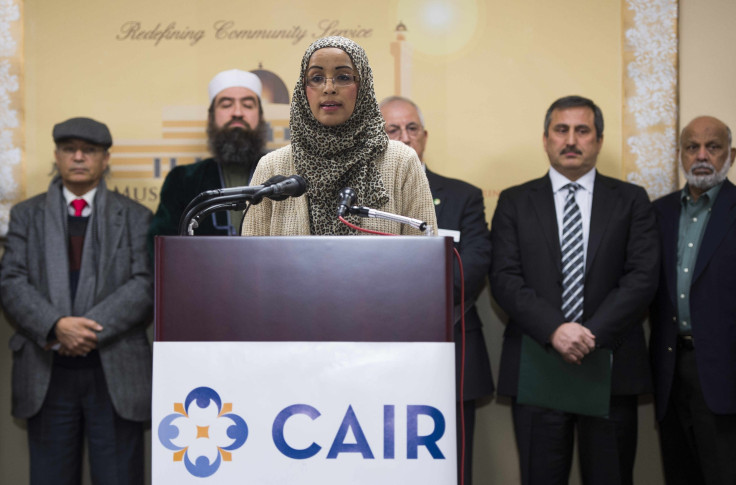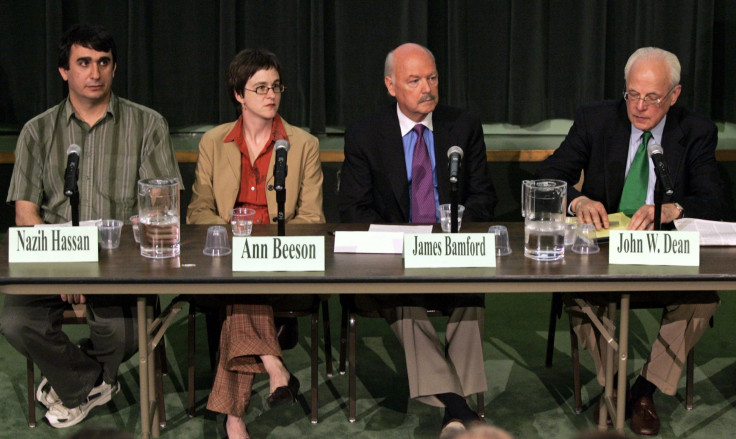What Is CAIR? Muslim Civil Rights Group Struggles To Fight Islamophobia After Recent Shootings

After an exhausting workday of investigating threats, filing press releases and sending messages of support to Muslims across southern Florida, Hassan Shibly arrived home at 5 a.m. recently to find a new voicemail message waiting for him. A nearby mosque had received a death threat. Shibly, chief executive director of the Council on American-Islamic Relations’ (CAIR) Florida chapter, had more work to do.
“I think every single Muslim community needs to have people advocating for it,” Shibly said. “We’re extremely concerned about protecting our community as Americans, and, secondly, when a person involved in these shootings happens to be Muslim, we’re concerned about protecting our community against the backlash that other communities don't have to face.”
After one of the suspects in Wednesday’s mass shooting in San Bernardino, California, was identified as a Muslim, CAIR moved to respond once again. As the country’s largest Muslim civil rights and advocacy group, CAIR is used to playing this kind of role. But over the past several months, the organization has seen an unprecedented increase in anti-Muslim sentiment and attacks, which it attributes to backlash from recent mass shootings and rhetoric coming from national political candidates. The group has built connections with local communities that it says are crucial to increasing education about Muslims, but as the tide of Islamophobia continues to rise, the group’s chapters are struggling to keep up.
Increasing Need For Response
CAIR was founded in 1994, and it has worked over the past two decades to advocate for Muslims’ civil rights, respond to bias incidents and do outreach and education work to increase Americans’ awareness of Islam. The organization has grown tremendously in the years since 9/11, when the American Muslim community experienced a period of intense backlash after those terrorist attacks, which killed nearly 3,000 people. In 2001, CAIR had eight chapters -- now it has chapters in more than 20 states across the country.
Each chapter is incorporated as its own nonprofit and typically responds to situations in its own area. Chapters develop close relationships with local law enforcement, state attorneys general and other civil rights or faith groups that can help stand up to discrimination.
“We know that many Americans don’t know much about Islam except what they see on the news. This news tends to define American Muslims, and we reject that," Nihad Awad, CAIR’s national executive director, said. “Just because a crime was committed by someone who happened to be a Muslim, we should not be painted with one brush.”
Awad and other Muslim leaders say they know to expect a backlash after shootings like the one in San Bernardino Wednesday that killed 14 people and recent terror attacks in Paris that left hundreds wounded or dead. There were 27 instances of anti-Muslim attacks in the U.S. since the Nov. 13 killings in Paris, a Nov. 24 CAIR report found, and the number has grown since then. These attacks ranged from bomb threats at mosques around the country, to destroyed Qurans left at Islamic shops, to the shooting of a Muslim taxi driver last week in Pittsburgh.
Even before the most recent attacks, anti-Muslim sentiment had been on the rise. Last year, the FBI found that hate crime incidents in general fell nationally, while hate crimes against Muslims increased.

Building Partnerships
As CAIR has needed to respond to an increasing level of Islamophobia in the U.S., many chapters have grown more innovative in their approaches to advocacy. At Shibly’s chapter in Florida, CAIR has recently started working with law enforcement officials and the Department of Homeland Security to offer community safety training that teaches organizations how to respond to a shooting event such as the one in San Bernardino. They started the partnership this year after seeing so many mass shootings take place across the U.S. and now offer the training free of charge to any community organization, church, synagogue or mosque in the area.
Interfaith partnerships are particularly important to spreading awareness about Islam and to standing up to Islamophobia, many CAIR leaders said. In Ohio, where the three CAIR offices each have just a few staff members, Cleveland Executive Director Julia Shearson said she relies on her interfaith partners to make it through busy times like she’s experiencing now.
“There’s so many anti-Muslim incidents right now that we can hardly keep up with the transom. In the interfaith community, people call us and say, 'We see you’re having this issue; can we help,'” she said. “The [Muslim] community feels alone and afraid -- almost psychologically -- but we also remember that we are not alone. Those interfaith partnerships are what sustain us and get us through this.”
In Baltimore, CAIR worked with groups such as the NAACP, ACLU Baltimore and the Baltimore Jewish Council after Freddie Gray, a 25-year-old black man, was killed in police custody, prompting unrest in the city.
“Any community that has been targeted, we stand in solidarity with them,” said Zainab Chaudry, the Maryland outreach manager in CAIR’s national office. “If there’s a hate crime that targets any other community of faith, we reach out to them and express solidarity with them. That helps strengthen solidarity for future events.”
Beyond interfaith partnerships, Muslim leaders have developed more ways to reach people through social media in recent years. In the past, CAIR might have struggled to gain access to mainstream media outlets, according to Awad, the national executive director. But now many chapters post information on Twitter and Facebook, and can draw millions of viewers to press conferences by posting them on YouTube.
“We learn a lot from organizations that have been doing this work longer than us, like ACLU and NAACP, but what’s new is, we’re part of a network of American Muslim leaders nationwide,” Shibly, the Florida director, said. “We’re asking questions like, ‘How can we do viral social media campaigns to get our message out?’ We’re mixing old tactics and new tools.”

Struggling To Keep Up
Shibly, who is based in Tampa, directs two offices in Florida and said his chapter is one of the largest CAIR organizations nationwide. But even there, he said his staff is overburdened. Due to the recent increase in anti-Muslim sentiment, he plans to add five staff members next year, which will bring the Florida chapter to more than 20 people.
Shibly’s story of working until 5 a.m. after the Paris attacks is not uncommon among other CAIR chapters. Shearson in Ohio also said she has worked 12- or 14-hour days in recent weeks and has even called in groups of volunteers to help cover basic administrative tasks so she can focus on responding to anti-Muslim threats.
As a nonprofit, CAIR relies on mostly private donations from its local communities. CAIR national had $2.2 million in total revenue in 2013, according to GuideStar, which provides information about nonprofits. In comparison, the American Civil Liberties Union reported about $64 million in revenue in 2014, the most recent year for which data were available.
There are positive signs, like the Florida chapter’s increasing size. Shibly said he is able to hire more people because his chapter raised double the funds this year compared with last year, which he attributes in part to the sense of urgency his community feels right now.
But for smaller communities, their religious focus can sometimes mean a narrower pool of interested donors than other nonprofits might experience. Shearson said her chapter gets most of its funding from Muslims and interfaith groups who sometimes offer to help.
“The Latino communities and immigration advocacy groups seem to be able to get grants for the work they do. But major donors, corporations or progressive groups -- people perceive us as being a religious group, and that impacts the way people give,” she said.
Despite the challenges, CAIR leaders said they feel their work is most important in times like these.
“We can’t remain silent and allow our narrative to be defined by the actions of individuals who do not represent our religion," Chaudry, the Maryland outreach manager, said. "I’ve had so many people come up to me and tell me that engaging in dialogue has helped change their perceptions of Muslims. Until we can take that step and walk through that door, we’re going to remain in our bubbles and contribute to hatred -- that’s not how we’re going to make a better America.”
© Copyright IBTimes 2024. All rights reserved.






















